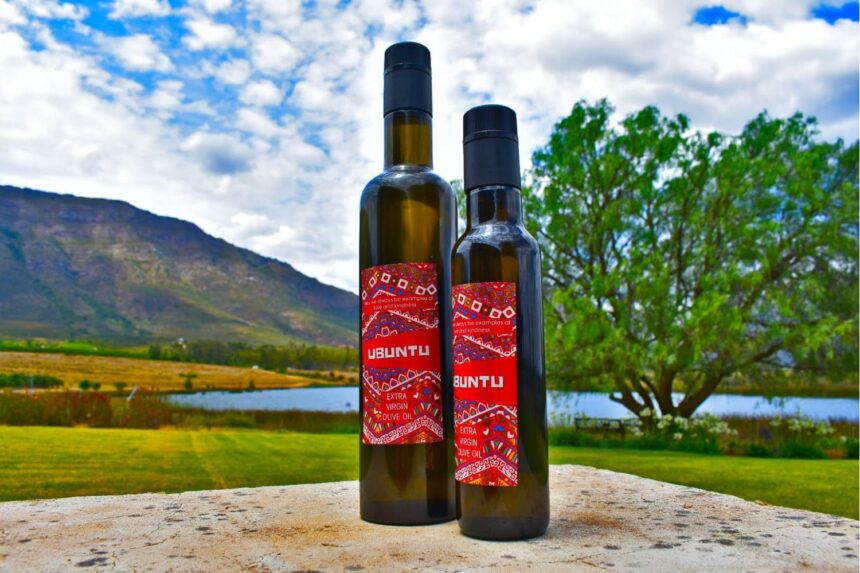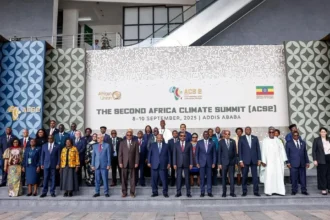Loyiso Manga, South Africa’s first black olive oil producer, is aiming to establish his own olive farm amid a global supply crisis affecting the olive oil industry. Manga, the founder of Ubuntu Extra Virgin Olive Oil, has gained recognition for his efforts in creating a successful black-owned olive oil brand, which is now available in major retail outlets like Woolworths.
The global olive oil market is currently facing challenges, including supply shortages, which have prompted Manga to consider expanding his operations to ensure a steady supply of olives for production. Currently, South Africa consumes about 3.5 million litres of olive oil annually, with less than 20% produced locally, indicating significant potential for growth in the industry.
Manga’s journey from unemployment to becoming a prominent figure in the olive oil sector is inspiring. He has also achieved accolades, including a Gold Award at the World Olive Oil Competition, and is working on obtaining Halaal certification for his products. His vision reflects a broader opportunity for increased local production in response to rising consumer demand for olive oil, which is valued for its health benefits and culinary uses.
Global Olive Oil Shortages: Causes and Impacts
Overview
The global olive oil market has recently faced significant disruptions leading to shortages and increased prices. These shortages have been influenced by a variety of factors including climatic conditions, geopolitical tensions, and economic challenges. Olive oil, a staple in many cuisines and valued for its health benefits, is primarily produced in the Mediterranean region, with countries like Spain, Italy, and Greece being the leading producers.
Causes of Olive Oil Shortages
Climatic Conditions
Drought: Prolonged droughts in key olive oil-producing regions, particularly Spain, have drastically reduced olive yields. Spain, which is the world’s largest producer of olive oil, has seen its production drop significantly due to inadequate rainfall and high temperatures.
Heatwaves: Extreme heat has also affected olive trees, causing stress and reducing their fruit-bearing capacity. This has led to lower harvests and, consequently, lower olive oil production.
Pests and Diseases
Olive Tree Pests: The olive fruit fly and other pests have caused significant damage to olive crops. These pests thrive in warmer temperatures, which have become more common due to climate change.
Xylella fastidiosa: This bacterial disease has devastated olive groves in Italy and other parts of Europe, leading to the loss of millions of trees.
Geopolitical Tensions
Trade Disruptions: Geopolitical issues, including trade disputes and tariffs, have affected the export and import of olive oil. Sanctions and trade barriers can limit market access and disrupt supply chains.
War and Conflict: Conflicts in olive-producing regions can lead to the abandonment of farms and disruption of agricultural activities.
Economic Factors
Rising Production Costs: Increased costs of labor, fertilizers, and other inputs have made olive oil production more expensive. Economic instability in producing countries can also impact production levels.
Market Speculation: Speculation in the commodities market can drive up prices, exacerbating the effects of actual shortages.
Impacts of Olive Oil Shortages
Price Increases: The most immediate impact of olive oil shortages is a sharp increase in prices. Consumers around the world have experienced higher costs for olive oil, which can affect household budgets and food industries that rely on this ingredient.
Substitution and Adulteration: With olive oil becoming more expensive, some consumers and manufacturers may turn to cheaper alternatives like sunflower or canola oil. There is also a risk of adulteration, where lower-quality oils are mixed with olive oil to cut costs, potentially misleading consumers.
Economic Impact on Producers: While higher prices can benefit some producers, those affected by climatic conditions and diseases may struggle to maintain their livelihoods. Small-scale farmers are particularly vulnerable to these challenges.
Global Supply Chain Disruptions: Shortages in one region can have ripple effects across the global supply chain. Countries that rely heavily on imports may face significant challenges in securing enough olive oil to meet domestic demand.
The global olive oil shortage is a multifaceted issue driven by environmental, economic, and geopolitical factors. Addressing these shortages requires a combination of sustainable agricultural practices, investment in disease and pest control, and strategies to mitigate the impacts of climate change. As the world navigates these challenges, consumers and producers alike must adapt to the evolving landscape of olive oil production and supply.
ALSO READ: South Africa’s top poultry producer flags bird flu risk amid vaccine delays














Your article helped me a lot, is there any more related content? Thanks!
I don’t think the title of your article matches the content lol. Just kidding, mainly because I had some doubts after reading the article.